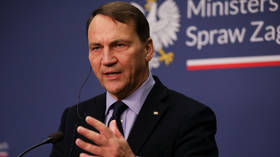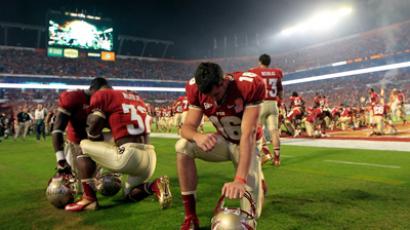Over half of Republicans want to ignore Bill of Rights, make Christianity national religion

America's Founding Fathers may have explicitly banned the formation of a national religion, but don’t tell that to Republican Christians. A poll found that over half of the religious right wants to establish Christianity as the country’s official creed.
When asked if they supported “establishing Christianity as the national religion,” 57 percent of the Republicans surveyed told Public Policy Polling (PPP) that they were in favor. Three in ten opposed turning the US into a theocracy, while 13 percent were unsure.
The Bill of Rights expressly prohibits the government from promoting one religion over others: “Congress shall make no law respecting an establishment of religion, or prohibiting the free exercise thereof,” the Constitution’s First Amendment states.
Women were more likely to support the official establishment of Christianity in the US, with two-thirds – 66 percent – responding “yes” to the question, while less than half the men surveyed – 49 percent – chose that option.
READ MORE: Is ‘Year of the Bible’ making Christianity official religion of US?
“It’s convenient that Republicans are so willing to ignore the Bill of Rights when it conflicts with any aspect of Christianity, but if you even for one minute mention any form of gun control, then you’re trying to destroy the Constitution and ruin America,” Amy Eddings wrote for Ring of Fire Radio.
Science fared even worse than the First Amendment. The poll’s finding “supports the growing perception liberals have of conservatives,” meaning Republicans are “anti-science Christian theocrats,” the New Civil Rights Movement wrote.
Those Republican primary voters who identified as members of the Tea Party were less likely to believe in evolution – only 27 percent were fans of Charles Darwin’s theory – than the 46 percent who believe in evolution and did not identify as part of the ideological group. Overall, 37 percent of those surveyed believe in the theory, with less than half – 49 percent – disbelieving. A majority of Tea Party members – 61 percent – said they don’t accept the theory of evolution.
When it came to global warming, only a quarter of respondents said they believe in climate change, while two-thirds – 66 percent – do not. Self-identified Tea Party members were vehemently against the scientific phenomenon, with 91 percent being so-called “climate deniers.”
Women were more likely to believe in global warming, at 30 percent. Only 20 percent of men agreed. Meanwhile, women were less likely to believe in evolution – 30 percent, compared to 43 percent of males.
Dreams of Christian theocracy: GOP majority wants Christianity as national religion http://t.co/2eeuoVxAxhpic.twitter.com/FAkJrdVUQ9
— Michael Stone (@pdxprogressiveX) February 24, 2015
Along with political polling, PPP is known for asking off-beat questions in its surveys. In 2013, the company announced that about 13 percent of Americans believe Obama is the anti-Christ, nearly 30 percent believe in aliens, and four percent believe lizard people control the US.
That same survey also asked about climate change, finding that 51 percent of Americans believed in global warming, while 37 percent said the whole idea is a hoax. This margin was particularly high among Republicans, of which 58 percent said climate change is a made-up phenomenon.
PPP, a Democratic-leaning firm, surveyed 316 Republican primary voters from February 20-22. The margin of error was 5.5 percentage points. The survey also asked questions about potential primary candidates and the favorability of Israeli Prime Minister Benjamin Netanyahu.














